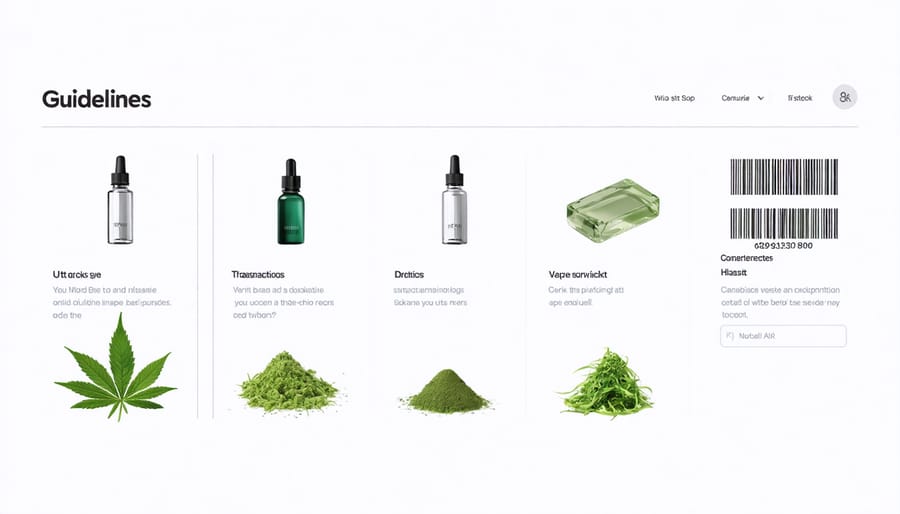Navigating Canadian cannabis retail standards demands precision and compliance when establishing an online vape store Canada. Digital age verification systems, secure payment processing, and robust age-gated websites form the foundation of legitimate cannabis vape retail operations. Provincial regulations require strict inventory tracking systems, comprehensive product testing documentation, and transparent chain-of-custody records for all vape products. Customer data protection protocols must align with both PIPEDA requirements and cannabis-specific privacy regulations, while maintaining detailed transaction records for regulatory audits.
Modern e-commerce platforms need integration with seed-to-sale tracking systems, real-time inventory management, and automated compliance checking mechanisms. Retailers must implement sophisticated delivery verification protocols, including ID validation at multiple touchpoints and secure signature requirements. Product listings require standardized testing certificates, detailed ingredient disclosures, and clear health warnings in both official languages.
Success in this regulated space depends on establishing reliable supplier relationships, maintaining detailed compliance documentation, and creating robust standard operating procedures that exceed minimum requirements. This proactive approach to regulatory adherence protects both business interests and consumer safety while positioning operations for sustainable growth in Canada’s evolving cannabis market.
Legal Framework for Online Cannabis Vape Sales
Provincial Licensing Requirements
To operate a legal online cannabis vape retail business in Canada, retailers must obtain specific licenses that vary by province. In Ontario, the Alcohol and Gaming Commission (AGCO) requires a Retail Operator License and a Retail Store Authorization for each online platform. British Columbia mandates licensing through the Liquor and Cannabis Regulation Branch (LCRB), with additional requirements for vaping retail best practices and age verification systems.
Alberta retailers must secure licensing through Alberta Gaming, Liquor and Cannabis (AGLC), while Quebec’s strict regulations through the Société québécoise du cannabis (SQDC) limit online sales to government-operated platforms. Manitoba and Saskatchewan offer more flexible private retail models but maintain stringent security and compliance requirements.
All provinces mandate secure payment processing systems, robust age verification protocols, and detailed record-keeping of transactions. Retailers must also maintain current knowledge of provincial regulations, as requirements can change frequently. Annual license renewals and regular compliance audits are standard across all jurisdictions, with fees and processing times varying by province.
Age Verification Standards
Age verification is a cornerstone of compliant online cannabis vape retail operations in Canada. All online retailers must implement a robust two-step verification process to confirm customers are of legal age before completing any purchase. The primary verification occurs during account creation, requiring customers to provide government-issued identification and date of birth. This information must be cross-referenced with official databases to ensure authenticity.
The secondary verification takes place at the point of delivery, where carriers must verify the recipient’s age and identity through valid photo identification. Retailers are required to maintain detailed records of all age verification processes for regulatory compliance and potential audits.
Digital age-gates must be prominently displayed on website landing pages, requiring visitors to confirm their age before accessing product information. These gates must be impossible to circumvent and include clear warnings about age restrictions. Retailers must also implement sophisticated fraud detection systems to identify and prevent attempts to bypass age verification protocols.
Additional measures include mandatory age verification prompts during checkout and automated systems to flag suspicious patterns in customer verification attempts. Non-compliance with these standards can result in severe penalties, including license suspension and substantial fines.

Essential E-Commerce Security Standards
Payment Processing Requirements
Implementing secure payment processing systems is crucial for online cannabis vape retailers, requiring compliance with both financial regulations and cannabis-specific guidelines. Payment gateways must meet stringent security standards, including PCI DSS compliance and enhanced fraud prevention measures. Additionally, retailers should understand their cannabis business insurance requirements to protect against financial risks.
Age verification integration within the payment process is mandatory, requiring multi-step authentication before transaction completion. Retailers must maintain detailed transaction records and implement systems that can flag suspicious purchasing patterns. Payment solutions should offer end-to-end encryption and secure customer data storage in compliance with PIPEDA regulations.
Accepted payment methods typically include credit cards, Interac e-Transfer, and other approved electronic payment systems. Cash-on-delivery and cryptocurrency payments are generally not permitted due to regulatory restrictions. Payment processors must be licensed to operate within Canada and have specific protocols for cannabis-related transactions.
Regular security audits and updates of payment systems are essential to maintain compliance and protect against emerging threats. Staff training on payment security protocols and fraud detection is crucial for maintaining operational integrity. Retailers should also establish clear refund policies and dispute resolution procedures that align with both payment processor requirements and cannabis regulations.
Data Protection Protocols
Data protection in online cannabis vape retail requires stringent protocols to safeguard customer information and maintain compliance with both cannabis regulations and privacy laws. Retailers must implement robust security measures that align with the Personal Information Protection and Electronic Documents Act (PIPEDA) and provincial privacy legislation.
Customer data collection should be limited to essential information required for age verification, purchase processing, and delivery confirmation. This includes implementing secure payment gateways that meet Payment Card Industry Data Security Standard (PCI DSS) requirements to protect financial transactions.
Retailers must establish clear data retention policies, specifying how long customer information is stored and ensuring secure disposal methods when data is no longer needed. All customer data should be encrypted both during transmission and storage, with regular security audits to identify and address potential vulnerabilities.
Staff training is crucial for maintaining data protection standards. Employees must understand their responsibilities regarding customer privacy, including proper handling of personal information and breach reporting procedures. Access to customer data should be restricted to authorized personnel only, with detailed logs maintaining accountability.
Regular privacy impact assessments help ensure compliance and identify areas for improvement. Retailers should maintain transparent privacy policies that clearly communicate how customer data is collected, used, and protected. In the event of a data breach, having an incident response plan is essential for swift action and regulatory compliance.
Product Quality and Safety Standards

Product Testing Requirements
All cannabis vape products must undergo rigorous laboratory testing before being approved for online retail distribution. Licensed producers must submit their products to Health Canada-accredited laboratories for comprehensive analysis of cannabinoid content, terpene profiles, and potential contaminants. Testing requirements include screening for heavy metals, pesticides, microbial contamination, and residual solvents.
Retailers must maintain detailed documentation of test results for each product batch, including Certificates of Analysis (COAs) that verify compliance with safety standards. These documents should be readily available upon request from regulatory authorities and should be archived for a minimum of two years.
Product testing documentation must include:
– Batch identification numbers
– Testing date and laboratory information
– Detailed cannabinoid potency analysis
– Terpene content breakdown
– Contaminant screening results
– Shelf-life stability data
– Quality assurance signatures
Products that fail to meet established safety thresholds must be immediately removed from online platforms and quarantined. Retailers should implement a robust tracking system to monitor testing compliance and expiration dates, ensuring only validated products remain available for sale. Regular quality assurance audits are essential to maintain testing compliance and protect consumer safety.
Storage and Handling Guidelines
Proper storage and handling of cannabis vape products is crucial for maintaining product quality and safety while ensuring regulatory compliance. Store all vape products in a temperature-controlled environment between 18-24°C (64-75°F) and maintain relative humidity levels between 45-65%. Keep products away from direct sunlight and extreme temperature fluctuations to prevent degradation of both the cannabis extracts and hardware components.
Implement a robust inventory management system that tracks batch numbers, expiration dates, and storage conditions. All products must be stored in their original, sealed packaging in a secure, access-controlled area. Staff handling these products should wear appropriate protective equipment and follow strict hygiene protocols.
Regular inventory audits are essential to identify any compromised products or storage condition variations. Establish clear protocols for handling returned or damaged products, including proper documentation and secure disposal methods that comply with local regulations.
For products in transit, maintain appropriate temperature controls and use impact-resistant packaging. Train staff on proper handling procedures, including protocols for receiving shipments, stock rotation, and quality inspection. Document all handling procedures and maintain detailed records of storage conditions, handling incidents, and any product quality issues for regulatory compliance and quality assurance purposes.

Customer Service Excellence
Exceptional customer service is a cornerstone of successful online cannabis vape retail operations. Retailers must establish clear communication channels, including live chat support, email, and phone options, with guaranteed response times within 24-48 hours. Staff should be thoroughly trained in product knowledge, age verification procedures, and compliance requirements to provide accurate, legally-sound assistance.
Creating detailed FAQ sections addressing common customer inquiries about shipping, returns, product usage, and safety guidelines helps streamline support operations. Implementation of cannabis loyalty programs can enhance customer satisfaction while building long-term relationships with verified clients.
Support staff must maintain detailed documentation of all customer interactions, particularly regarding age verification and product complaints, to ensure compliance with regulatory requirements. Establishing a clear returns and exchange policy that aligns with federal and provincial regulations is essential, including procedures for handling defective products.
Privacy protection should be prioritized in all customer service interactions, with staff trained in handling sensitive information according to PIPEDA guidelines. Regular customer feedback collection through surveys and review systems helps identify areas for service improvement while maintaining compliance with advertising restrictions.
Customer service representatives should be equipped to provide harm reduction information and direct customers to appropriate healthcare resources when necessary, without offering medical advice. This balanced approach ensures responsible service while maintaining professional boundaries and regulatory compliance.
Operating a successful online cannabis vape retail business in Canada requires careful attention to multiple regulatory and operational standards. From maintaining robust age verification systems to implementing secure payment processing and ensuring proper product storage, each element plays a crucial role in creating a compliant and trustworthy operation.
Retailers must prioritize ongoing education about evolving regulations, maintain detailed documentation of compliance measures, and regularly update their standard operating procedures. The importance of working with licensed suppliers, conducting thorough product quality checks, and maintaining transparent customer communication cannot be overstated.
Success in this industry depends on balancing regulatory compliance with customer service excellence. By implementing comprehensive staff training programs, maintaining secure inventory management systems, and staying current with industry best practices, retailers can build sustainable businesses that serve their communities responsibly.
Remember that compliance isn’t just about meeting minimum requirements – it’s about establishing a foundation for long-term success in Canada’s regulated cannabis market. Retailers who embrace these standards while maintaining operational efficiency will be better positioned to thrive in this growing industry.




